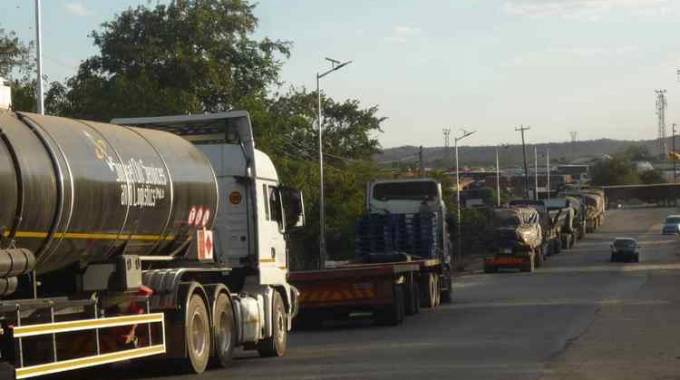SADC tightens measures on truck drivers

Roselyne Sachiti Features, Health and Society Editor
Haulage truck drivers play a pivotal role in the economies of many countries. Known as “gonyeti drivers” in Zimbabwe’s street lingo, the truck drivers transport food, gas, raw materials and finished goods across the country and into neighbouring states, keeping trade alive. Their job is no stroll in the park, it involves long hours on the road and weeks away from their families and loved ones.
With the coming of the novel coronavirus (Covid-19), truck drivers, in the Southern Africa Development Community (SADC) region are one of the essential service providers moving from one member state to the next as they deliver cargo.
This was made possible by regional guidelines on harmonisation and facilitation of cross border transport operations across the region released by the SADC secretariat early April. Regulations on trade and transport allowed vehicles with cargo that includes food, medical equipment, medicines and personal protective equipment (PPE), fuel including coal, agricultural inputs and supplies among others to be allowed to operate inter-state in order to ensure continuity supply chains.
Snaking their way from South Africa, via Zimbabwe to Mozambique and Malawi, truck drivers have risked it all, with some being infected by Covid-9 while in transit.
In early May, six Zimbabwean truck drivers tested positive for Covid-19 in Zambia, after crossing into that country through the Chirundu Border Post.
Back then, Zambian Health Minister Dr Chitalu Chilufya told the media: “Therefore today’s report on the tests that were done in Lusaka out of the 161 tests conducted by our laboratories in the last 24 hours, we recorded 14 new cases. Out of these 14 new cases, 10 were truck drivers coming through Chirundu Border Post. Out of these, 4 were Zambians and 6 were Zimbabweans and 3 were detected through routine testing and 1 was a contact of a known case.” In some cases, truck drivers have been accused of smuggling returnees who will be evading quarantine thereby risking local transmission of Covid-19.
On Monday, the Zimbabwean Government announced the tightened enforcement of lockdown provisions, especially among truck drivers and returnees, where a huge number of cases were being reported.
Briefing the media, Information, Publicity and Broadcasting Services Minister Senator Monica Mutsvangwa said in view of the risk of transmission posed by truckers and returnees, measures that include increased enforcement through joint roadblocks in order to flush out rogue truck drivers so that they are penalised if they are contravening lockdown regulations had been put in place.
She also revealed that simplified educational materials are to be distributed to truckers so that they familiarise themselves with regulations guiding their stay in the country had also been introduced. Additionally, some of the regulations in line with Statutory Instrument 93 of 2020 include truckers stopping at designated stops, subjecting themselves and their goods to disinfection should they offload here in Zimbabwe, the minister further advised.
Her announcement came days after the SADC Regional Response to Covid-19 Pandemic Bulletin 6 also gave an update with regards to cross border truck drivers.
In the latest bulletin, SADC acknowledged that cross-border transport movement is one of the essential services that need to be sustained and facilitated during the Covid-19 period in order to ensure timely delivery of essential supplies and commodities in member states.
More than 80 percent of imported and exported goods in the SADC region are transported through the road network.
“The Covid-19 related lockdowns in Member States and the associated public health measures resulted in significant delays in the movement of hauling vehicles and subsequently in the delivery of essential supplies to the point of use. An analysis of the implementation of the SADC guidelines on harmonisation and facilitation of cross-border operations across the region revealed that member states were implementing trade and transportation laws and regulation differently during the Covid-19 emergency,” the bulletin points out.
The bulletin also found out that congestion at border posts were a result of lack of harmonisation of public health measures at border posts, such as testing and quarantine policies. It further highlights some good practices in cross-border transportation despite the challenges. For instance, Botswana and Zambia cooperated to clear traffic which had built up at Kazungula during the first week that member states implemented national Covid-19 measures by joint clearance and collaboration between border agencies and the use of a temporary bridge. The Democratic Republic of Congo and Zambia collaborated in clearing traffic which had built up at Kasumbalesa by among others implementing one-stop border post operational modalities, allowing officials to operate jointly from each other’s territory and opening an additional road connection between the two borders, the bulletin notes.
“Zimbabwe designated and published a map of truck stops and garages which could be used by trucks during Covid-19; in Namibia, a public and private partnership constructed a temporary quarantine facility for trucks in Walvis Bay. The facility is fully equipped with Covid-19 hygiene requirements, resting facilities, ablution and is secured by the police who protect drivers, cargo and vehicles; and Angola simplified and waived requirements for submission of stamped original hard copies of documentation and switched to accepting electronic submissions.”
Recommendations include the implementation of the SADC guidelines on facilitation of cross-border transportation with emphasis on the relay system and Covid-19 testing policy.
SADC also called for the incorporation of the SMART corridor building blocks that monitor through Information and Communication Technology (ICT) physical movement of vehicles/drivers/loads and documentation flow through ports, borders weighbridges and Covid-19 test and quarantine facilities.
The regional bloc also encouraged inter-state travelling of persons for economic growth and poverty alleviation while containing the spread of the virus once provisions for safe trade and transport facilitation are in place, which include greater use of ICT, electronic documents and more paperless operations.
According to the bulletin, the secretariat has developed revised guidelines and regional standard operating procedures for management and monitoring of cross-border road transport at designated points of entry and Covid-19 checkpoints.
The procedures include recommended testing protocol, mutual recognition of test results and a recommended test validity period.
“These are under review and will be discussed by the expanded technical committee on the monitoring of the protocol on health at its upcoming virtual meeting on June 5, 2020.”
The bulletin also said the Development Bank of Southern Africa had confirmed support towards PPE provision.
“EU has committed additional resources to the tripartite transport and transit facilitation programme to support activities related to trade and transport during Covid-19, in particular, the development of an electronic surveillance system for drivers and vehicles in inter-state transport as part of Covid-19 response measures.”









Comments